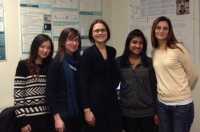Partnerships That Make a Difference
 Dr. Yana Yunusova is both a speech-language pathologist and speech scientist who has dedicated her professional career to investigating and treating different aspects of neurogenic speech disorders. Dr. Yunusova came to the University of Toronto in 2007 and established two laboratories: a Speech Production Lab at the University of Toronto and a Bulbar Function Lab at Sunnybrook Health Sciences Centre. She is in the process of establishing a third lab at the Toronto Rehabilitation Institute. She has dedicated most of her research time to examining different aspects of speech decline in individuals who suffer from Amyotrophic Lateral Sclerosis (ALS), a devastating neurodegenerative disease. Her impressive research program includes both cross-sectional and longitudinal studies examining behavioural and neurological aspects of speech dysfunction in those suffering from ALS.
Dr. Yana Yunusova is both a speech-language pathologist and speech scientist who has dedicated her professional career to investigating and treating different aspects of neurogenic speech disorders. Dr. Yunusova came to the University of Toronto in 2007 and established two laboratories: a Speech Production Lab at the University of Toronto and a Bulbar Function Lab at Sunnybrook Health Sciences Centre. She is in the process of establishing a third lab at the Toronto Rehabilitation Institute. She has dedicated most of her research time to examining different aspects of speech decline in individuals who suffer from Amyotrophic Lateral Sclerosis (ALS), a devastating neurodegenerative disease. Her impressive research program includes both cross-sectional and longitudinal studies examining behavioural and neurological aspects of speech dysfunction in those suffering from ALS.
Dr. Yunusova’s institutional partnerships are enhanced by the professional collaborations she has with a number of speech scientists, neuroscientists, neurologists and computer scientists in Canada and the US. These collaborations form the basis of a very busy and enriching research life in three main areas: 1) the assessment of speech dysfunction in ALS; 2) the use of neuroimaging to establish the neurological correlates of decline in speaking and cognition (thinking) that occurs for different neurologic conditions/diseases; and 3) the development of novel treatments for individuals suffering speech disorders due to neurologic insults and diseases (e.g., stroke and Parkinson disease). She has a long-standing collaboration with Dr. Jordan Green, a speech scientist at the University of Nebraska-Lincoln, with whom Dr. Yunusova holds a substantial research grant from the National Institute of Health (NIH) in the US. She also works with Dr. Sandra Black, the research director of the neuroscience program at the Sunnybrook Research Institute (SRI) and with Dr. Lorne Zinman, director of the ALS Clinic at Sunnybrook, with whom she holds research grants from the NIH and ALS Society of Canada. With these partnerships, Dr. Yunusova is conducting important neuroimaging work needed to identify the neurological correlates of speech impairment in ALS, and is conducting important longitudinal work with state-of-the-art technology needed to identify stages of disease progression according to more sensitive behavioural criteria, and identify subtypes of ALS. This work will have a significant impact on both the diagnosis and treatment of the disease, leading to earlier diagnoses and more patient-specific treatment practices.
One of these treatment practices that Dr. Yunusova is particularly interested in comprises her third main area of research, that of the use of augmented visual feedback for speech rehabilitation. She has partnered with Dr. Melanie Baljko and Dr. Petros Faloutsos, computer scientists at York University, to develop a novel treatment approach based on visualization of tongue movements during speech tasks. Dr. Yunusova and her collaborators have received grant support from NSERC and the Canadian Centre for Innovation to develop game-based scenarios that interface with rehabilitative technology for use in a clinical setting. This new treatment model is being tested in Dr. Yunusova’s lab at the Toronto Rehabilitation Institute. This innovative game-based protocol aims to target speech disorders as a motor control issue, and has great promise to improve the efficacy of speech interventions from both a functional and economic perspective.
The on-going success of Dr. Yunusova is a direct reflection of the strong partnerships that she has established and maintains with a number of institutions and individuals who have dedicated their careers to investigating and developing innovation in the areas of speech science, neurogenic disorders and biomedical technology. It is also a reflection of her great team of research assistants and graduate students, who contribute daily to the advancement of the clinical research that has a significant impact on the way that speech disorders are assessed, categorized and treated in Canada and worldwide.